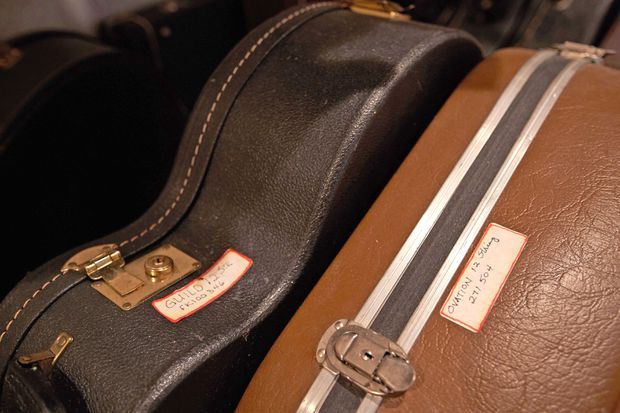Where Joni Mitchell and Neil Young left the country early in their career, Lightfoot stayed in Canada. He became the home team. Mitchell wrote Help Me, Young wrote Helpless, and Captain Canada, the canoe-tripping troubadour, wrote Carefree Highway and record-setting alimony cheques.
But when asked if the demands asked of Lightfoot were unreasonable, Finkelstein waved off the premise. “I’m not sure being a millionaire songwriter was ever all that hard,” he said. “These artists get a lot of phone calls, but I don’t think any of them are going to say it’s upsetting. The only complaints from them I ever heard backstage were about the cold-cut platters.”
Seated on the other side of me at the screening was Bruce Good, a musician who has known Lightfoot since the late and 1960s and who had a more sympathetic understanding of the pressures Lightfoot faced and still faces. “He realized people wanted a piece of him,” said Good, featured in the film, speaking about how Lightfoot’s wistful 1968 toe-tapper Did She Mention My Name makes his eyes well up to this day.
As part of the seminal Canadian folk-rock group the Good Brothers, Good has faced some of the pressures that Lightfoot does, though on a much smaller scale. “If I’m walking through a crowd of people at a concert, I put the blinders on, because I know if I make eye contact, they’re going to ask me something or want something. I can hardly imagine what it’s like to be Gordon Lightfoot.”
What it is to like be Lightfoot is to be asked of constantly. “Here comes mister cool along the walk of fame, I was in demand, always in control,” Lightfoot sang on 1998′s autobiographical single A Painter Passing Through. “The world was in my hands, my touch had turned to gold.”
Back in the 1970s, when the Sometimes When We Touch star Dan Hill needed a Learjet in the middle of the night in Moncton, he called Lightfoot.
After an indie-rock band recorded Lightfoot’s Great Lakes standard The Wreck of the Edmund Fitzgerald, one of the band’s musicians got upset when Lightfoot refused to recognize the cover version and accused him of lifting the song’s melody.
In 1966, with Canada’s centenary approaching, CBC needed an instant folk classic that captured the glory of the country’s spike-driven origins. Fuelled by coffee, cigarettes and a fat commission, Lightfoot wrote Canadian Railroad Trilogy in three days.
That same year, at a summer post-show party in Toronto, the star Canadian folkie Ian Tyson approached his friend Lightfoot at four in the morning. Earlier in the evening, Lightfoot had a introduced a new song to a crowd at the Riverboat coffee house.
“It’s a good one, Gordon,” Tyson said to Lightfoot at the after-party. “What it’s called?” Informed the song was Go My Way, Tyson made a request. I’d like to hear it again. Why don’t you go and get your old guitar and play it for me?”
A sleep-deprived Lightfoot acquiesced. There was no end to the requests made upon him.
A young John Macfarlane, who would go on to serve as editor of Toronto Life and the Walrus, was a music writer for The Globe in the 1960s. He was at the party where Lightfoot played for Tyson, and included the story about it in a Globe profile, one of the first major Lightfoot features ever published. “It struck me as an important Canadian moment,” Macfarlane recalled recently.
In Macfarlane’s interview with Lightfoot, the 27-year-old songwriter described himself as a “cosmopolitan hick” and a “country boy, doin’ the best I can.” As if he were a rube – or worse, a John Denver.
“I think that was a glib way of shutting down any further discussion,” said Macfarlane, who back then almost rented an apartment in the three-story home Lightfoot shared with his wife, before the couple wisely decided against sharing a house with a journalist. “He was learning how to deal with incursions into his psyche, which were not welcome. He was a working man, and his work was music.”
Indeed, sit-downs these days with Lightfoot rarely result in much reflection. However, when asked about new songs, the songwriter (who hasn’t put an album of fresh material since 2004’s Harmony) gleefully pops out of his chair to retrieve the lyric sheets to a couple of unrecorded songs he’s been working on for a new album. One of them is called The Laughter We Seek. The other one has the line, “I’ve got one too many women in my life.”
Lightfoot crows about the latter song: “How’s that for an idea, eh? Now, how would I come up with something like that?”
When it is suggested that a song about one woman too many would seem to be in the vein of For Lovin’ Me, the kind which he said he’d never write again, Lightfoot is quick to protest. “No, it’s not!” he says quickly. “That was a hurtful song. This is not hurtful. This is whimsy, you see?”
After the interview, we stand in his vaulted front hall, where some of the cast fixtures look out of place. Turns out Lightfoot had salvaged the pieces from the Rosedale mansion where he once played host to Bob Dylan, Ramblin’ Jack Elliott and all the others. “I didn’t want to leave that house," Lightfoot laments. So, why did he? “It was my former wife’s idea, to get away from downtown distractions.”
When asked if he’ll play the first concert at Massey Hall when the venue, currently undergoing extensive renovations, re-opens next year, Lightfoot eyes brighten. “I don’t want to hog the stage,” he says. “But if they want me to do it, I’ll be there.”
Lightfoot obliges, as he does.
